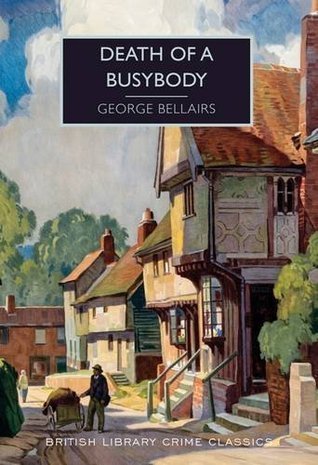Death Of A Busybody

Death of a Busybody – George Bellairs
It is something of a Golden Age crime fiction trope that a picture postcard perfect English rural village is really a seething cesspit of jealousies, rivalries, rumour, gossip and the occasional murder. George Bellairs’ 1942 creation of Hilary Magna and its satellite hamlet of Hilary Parva, created when two brothers inevitably fell out, follows this long and hallowed tradition. Death of a Busybody, featuring Bellairs’ detective creation, Inspector Littlejohn, is a wonderfully light confection, so moreish that it is difficult not to devour it all in one sitting.
Published in the darkest moments of the Second World War with the reading public desperate for a piece of light entertainment that would take their minds off the horrors of their diurnal existence, this book does not disappoint. It is laced with humour, both in the dialogue and also in Bellairs’ turn of phrase. We meet a gardener bending over his spade with “a huge backside protruding like some monstrous black toadstool” and the tongue of the busybody who is done away with, Miss Tither, is likened to a weapon “which she used like a pair of bellows, fanning a spark of a whisper into a consuming fire of chatter, a holocaust of pursuing flame.” And the names of some of his characters are just wonderful, not least the Reverand Ethelred Claplady, the grocer Allnutt. and pre-empting Joseph Heller, the village even boasts a Major Crabtree who was forced to change his first name to Wilfred by an enraged sergeant major.
Then there isPC Harriwinckle. It is another trope of works like this that the humble local bobby is a lumbering oaf and a figure of fun. Indeed, Hilary’s constable is not the brightest or the fittest, being too partial for his grub, and is involved in many of the moments of comedy in the book, but he knows the area, is industrious in his own way and plays a part in solving the murder. It was gratifying to learn at the end of the book that he had earned the promotion which was his great and the summit of his ambitions.
Miss Tither is the village busybody who knows everybody’s secrets and lets them know she does. She also is evangelical and supports charities that support fallen women and generally improve moral welfare. It is these two strands which combine to lead to her demise, found dead in the Vicar’s cesspool, a whimsical end which suits Bellair’s lightness of touch. Because the local force has a lot on, Littlejohn from the Yard is called in and gradually pieces together a complex puzzle involving marital indiscretions, an woman disappointed by her cousin’s deceitful behaviour, a seemingly unbreakable alibi, a piano organ that plays automated rolls of music, and bogus charitable organisations.
Although the puzzle is interesting, well plotted and the reader is kept guessing for much of the book, always the hallmarks of a good book of this genre, I was as much enchanted by the picture of wartime England that Bellairs was painting. Petrol is in such short supply that a local taxi driver has reverted to a horse and cart, land girls have been drafted in to keep the farms working and get the harvest in and labour is in short supply because so many men have been called up.
There is a strong religious undercurrent running through the tale with a village priest, an evangelical, a missionary and religious sects. Bellairs seems to have little time for the sort of recherche disputations that sects engage in to claim the moral high ground nor for those who only too readily see the faults of others but not their own.
I will certainly read more of Bellairs’ work and there is a lot of it. A bank manager by day by the name of Harold Blundell, he wrote 62 novels in his spare time, 58 as Bellairs and the remainder as Hilary Landon. If you like an undemanding but entertaining page turner, you cannot do better than this.



